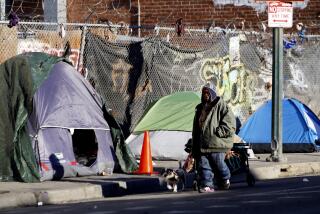From Doctor to Destitute: Retired Physician Lives on the Street
- Share via
SAN FRANCISCO — Forty years ago, Shannon Morgan was living the American dream. She had two talented children, a surgeon for a husband, a carriage house near Boston and an Ivy League medical degree.
Today, at age 67, she is homeless.
She is among a growing number of older adults--many of them women--forced onto the streets as rents go up and housing becomes scarce throughout the country’s big cities.
“I’m very much a loner,” says Morgan. “But I’m a Capricorn and I’m very grounded. Even if I’m living in a treehouse, it’d be my home.”
Homeless advocates say it’s a tale that’s becoming more common.
*
After waking every morning, Morgan submits her name to a bed lottery at a San Francisco shelter.
Until the shelter opens, she wanders the streets of San Francisco toting a 40-pound knapsack on her back and hauling her belongings on a luggage cart.
Most days, she takes a bus to Fisherman’s Wharf, where she has lunch for $1.25 at Aquatic Park. She checks on her storage space, which is stuffed chock-full with papers, clothes and food.
“I’m a pack rat,” she says with a laugh.
If she’s promised a bed, Morgan gets in line at 3 p.m. The lights go out at 10.
“I just want to wake up because the night has been so horrible,” she says.
Soon after she wakes, she puts her name in the lottery, and cycle begins again.
*
Like the other older women who show up at the Tenderloin District shelter night after night, Morgan once lived a life that gave no hint it could ever include homelessness.
The daughter of surgeons in Montclair, N.J., she led a privileged childhood filled with Arabian ponies, cotillions and ballet lessons. Summers were spent sailing in Upstate New York and Denmark.
In college, she majored in biology and joined a sorority, then went to work as a teacher and freshman dean before attending medical school at Cornell.
Two days after graduating in 1957, she married a classmate and settled in Brookline, Mass. She bore a son, then a daughter. She completed her residency in ophthalmology.
Along the way, she biked across the south of France, studied architecture at the Massachusetts Institute of Technology, attended a ball thrown for Queen Elizabeth and hitchhiked from Norway to Greece.
“If I have to use one word for the things I enjoy most, it would be ‘adventure,’ ” Morgan says.
Parties at Morgan’s home were always special--real candles on a 20-foot Christmas tree, or an authentic Greek meal, recalls Elizabeth Cady, a former neighbor.
“Things were never done in a very average way. Always above average,” says Cady, who now sits on the board of directors for the Committee to End Elder Homelessness in Boston. “She was always going to [maintain] very high standards at whatever she did. I think that can burn you out.”
Indeed, a dark side tinged Morgan’s blessed life.
As a child, she was dyslexic, but drove herself to excel.
“I had to prove I could climb those mountains,” she says.
She speaks of a demanding, distant mother, who one day served her pet lamb, “Lambie,” for Sunday dinner.
“That, in essence, is what happens in my life,” she says. “Nothing is simple in my life.”
When her children were teenagers, Morgan learned her husband was having an affair. The divorce took five years, and Morgan claims she got almost nothing from the settlement.
“It was shattering,” she recalls. “I was totally wiped out. I was always stepping aside--I gave up my career so he could be chief resident.”
Soon after, her daughter started showing signs of mental instability. It was familiar territory. Morgan’s sister also suffered from a mental illness, schizophrenia.
Several years after moving with her daughter to California in the early 1980s, she suffered a stroke. It was her third, and it forced her into retirement.
“I couldn’t operate anymore,” she says. “There’s no way you can touch a patient if you’ve had a stroke.”
She started forgetting things, had trouble with the smallest of tasks. She eventually lost her apartment. There was no pension.
For a year, she lived “under a pine tree” in Bolinas. Other years, she worked as a caregiver in exchange for housing.
Two years ago, she ended up on the streets when an elderly man she was caring for threw her out. Morgan says she doesn’t remember the details.
*
Diminutive, with a shining halo of silver hair and clear blue eyes, Morgan emanates an air of fragility.
Like most older adults, she has needs that go unmet at temporary shelters. She has heart problems so severe that doctors have warned her she could die any time, as well as asthma, chemical allergies, a bad knee and sleep apnea, a condition in which she stops breathing a dozen times a night.
Her sleep apnea machine must be plugged into an outlet, which poses a problem at the shelter. She turns down beds that are too far from electricity, and twice since March she’s ended up on the streets when not even a cot was available.
When asked if she could live with her son, a landscape architect in Washington, D.C., or her baby brother, an engineer in New Jersey, she dismisses the idea. She hates the cold, and has no wish to intrude on their busy lives. That reticence applies to living with her children as well, although she stays in contact with them.
Morgan is not the only grandmother on the streets, homeless advocates say.
“We are seeing more women in general, senior women in particular,” says Paul Boden, director of the Coalition for Homelessness in San Francisco. “It’s inhumane. Shelters have become a de facto level of housing for a growing group of people.”
Legislation enacted during the Reagan era provided for emergency care, but did not offer permanent housing for the homeless.
And budget cuts have closed many of the places that cared for the mentally ill, says Donna Townsend, executive director of the Committee to End Elder Homelessness, which this month opened a 40-unit home in Boston for low-income senior citizens.
“What we’ve found is that if you are elder, female and homeless, it’s more likely that you’re mentally ill. And these women tend to be fiercely independent,” she says.
Morgan, like the women Townsend now houses, refuses to take a route that might ensure her a bed--counseling for substance abuse or mental illness. That would mean handing over two-thirds of her Social Security payment--and losing her storage space for her belongings, including remnants of her former life--to get advice from someone with less medical education than herself.
“That’s a big farce. The smart ones know that,” she says.
And she shakes her head at housing hotels.
“Apartment is a dirty word to me. It’s just not in my vocabulary,” Morgan says. “I’d rather live under a pine tree, or in a treehouse, or in a tower. That’s my fantasy.”
More to Read
Sign up for Essential California
The most important California stories and recommendations in your inbox every morning.
You may occasionally receive promotional content from the Los Angeles Times.






